Ladder for the roof do it yourself
According to the requirements of modern building standards, the roofs of private residential buildings and economic structures that have a slope higher than a certain value should be equipped with a special ladder for working on the roof, allowing it to move along it without the risk of loss of balance. The need to use such a ladder is explained by the need to periodically examine the surface of the roofing in order to identify damaged areas on it that need urgent repairs.
Rationale for use

In addition to the ability to control the condition of the roof, the presence of a special staircase on the roof allows you to:
- to examine the outlets of ventilation and chimney ducts located on the roof;
- have access to the ridge of the roof, whose condition also needs to be prevented;
- and, finally, to protect the roof from damage that may occur when moving directly over the coating itself.
The latter circumstance is explained by the fact that some types of roofing coatings are very sensitive to unforeseen operational loads and can be deformed or even partially destroyed by the action of human weight when directly moving along them.

These features have modern membrane or self-leveling polymer coatings, as well as shingles known to many, which can lose their protective properties as a result of partial destruction. When considering the need for roof ladder equipment, one should also not forget about the high risk of falling from a steep slippery slope, which represents a very real danger to human health.
Of course, such an auxiliary device may well be purchased by you as a finished product at any specialty store. Nevertheless, the discussion of the topic dedicated to the construction of a ladder for the roof with his own hands, causes a certain interest in the user, who is used to doing everything on his own. But first, consider the known types of ladder structures used on the slopes of modern roofs.
Types of stair designs
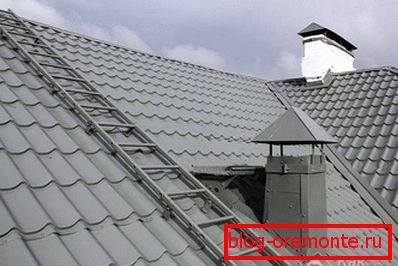
Known types of stair structures used on roof slopes may have the following versions:
- wooden stairs;
- solid metal stairs (steel or aluminum);
- prefabricated metal structures.
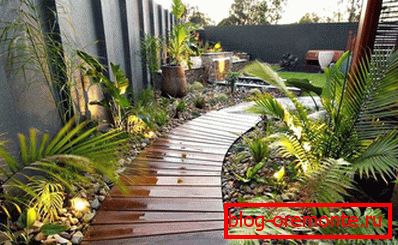
All these versions of ladder accessories can be used on the most different types of roofs, taking into account the peculiarities of their placement and fastening on the slopes. For the manufacture of wooden stairs used a standard set of wood blanks, which includes two supporting guides and several jumpers (the number of which is determined by the total length of the structure). Such ladders, as a rule, are placed directly on the roofing material with fixation in several points of the roof (for example, on the roof of slate or metal tile, the fastening is carried out with the help of special clamps mounted at the bottom of the wave).
Metal structures, as a rule, are made of steel pipes of suitable diameter or of aluminum profiles of standard size and fixed on the roof with the help of special brackets installed on rubberized gaskets. Industrial designs of such stairs are made of galvanized pipes coated with a powder coating on their surface (the color of the protective coating can be any, but most often black, white or brown are used). When self-fabricating the stairs to the roof, this color can be chosen to your taste, that is, individually.

Prefabricated metal ladder structures are assembled by building up from several independent modules without welding. To fix such structures on the roof and its elements, special fasteners or brackets are used, the choice of which is determined by the configuration of the ramps and the type of roofing material.
As a rule, for fixing the ladder structure on the roof of metal, for example, is used from 2 to 10 roof brackets and 2 ridge. A similar set of fasteners can be used when mounting the ladder on the roof of corrugated flooring with a low profile.
Prefabricated metal stairs consist of two parts (wall and roof sections), which allows you to climb them directly from the ground. When mounting the wall part of such structures, it should be remembered that the distance from their upper step to the eaves slice should not be more than 10 cm, and the distance from the ladder itself from the wall should be at least 20 cm.
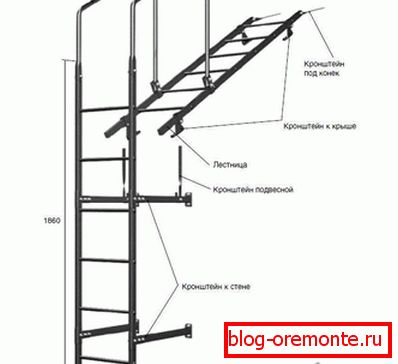
The roof section of the prefabricated structure is attached to the wall by means of special brackets, the elements of which pass through the roof covering, which is sealed with gaskets made of moisture-resistant rubber. To obtain the required length, the modules of the ladder or its sections are articulated with each other by bolted joints; at the same time the topmost link is fixed on the skate beam.
In the place of the docking of the wall section of the stairs with its roofing part, restrictive handrails are made to protect the person from falling.
Features of the manufacture of wooden structures
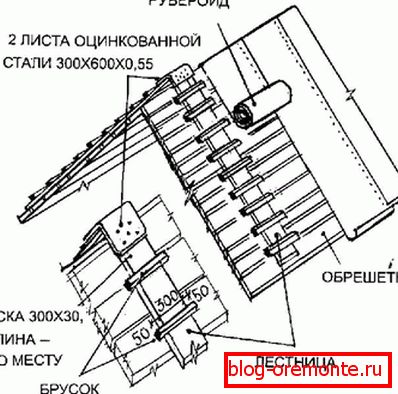
The order of self-production of a separate ladder on the roof slope, we consider the example of a wooden structure, as the most simple and cheap in execution.
For arrangement of such stairs you will need:
- blanks with a section of 160? 25 mm;
- a set of blanks and scraps of timber with a cross section of about 40 × 40 mm (40–60 mm);
- set of nails with a length of at least 100 mm.
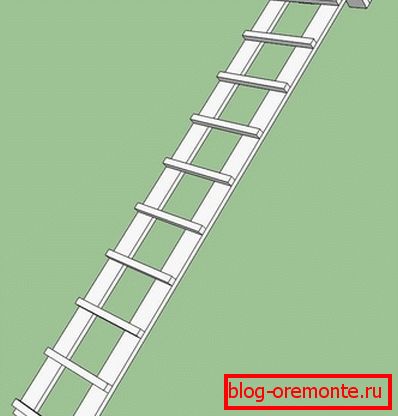
When assembling a structure, the focus should be on the following points:
- The width of the guide rails (not less than 160 mm) is chosen taking into account obtaining a distributed load, which excludes the possibility of damage to the roof material.
- On roofs with a wavy coating, the distance between the side rails of the tree should be chosen multiple of the wavelength, which allows you to have a ladder with a support on the hollow.
- For the manufacture of steps, cross-beams easier to use squared blanks, because the foot on them is held better than on the boards. Note that it is not necessary to part when choosing the distance between adjacent steps, since this, on the one hand, increases the weight of the finished structure, and on the other hand, reduces the convenience of moving along it.
- The steps are fastened to the guides with the help of nails per 100 mm, which are necessarily bent from the reverse side (with the tip of the tip hidden in the wood material).
- In order to be able to fasten the ladder on the skate - at its upper end it is necessary to provide a special element in the form of an additional thickening from scraps of timber. Particular attention should be paid to the reliability of its attachment to the base of the stairs.
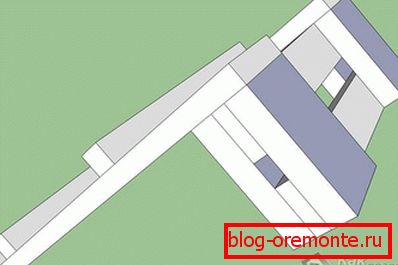

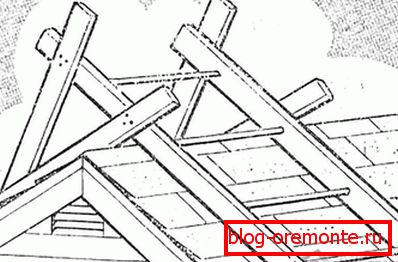
Such an additional fastener can be made of boards of sufficient thickness, which are attached to the base with nails at least 150–200 mm in size. To secure the ladder on the ridge, the hook thickness must be at least 30 cm.
Independent manufacture of prefabricated structures

Before you make a ladder in the form of a composite metal structure, we recommend that you carry out its preliminary assembly directly on the ground, which will allow you to perform all necessary procedures in safe conditions. In the process of such an assembly, the required length of the future structure is adjusted first (in accordance with the dimensions of the equipped ramp). After that, on the basis of the ladder, the elements of its fastening on the ridge are mounted, and the roofing brackets are welded with a pitch of about 2 meters.
And only at the end of all these procedures, the finished structure rises to the roof and hooks with a ridge bracket to the upper sheathing board. In the same way, i.e., the wall part of the ladder is also assembled on the ground. In the process of assembling, wall supports with a pitch of about 2 meters are mounted on it, as well as restrictive handrails. In addition, additional brackets are welded to the uppermost wall supports, which are used to fasten the structure to the cornice.
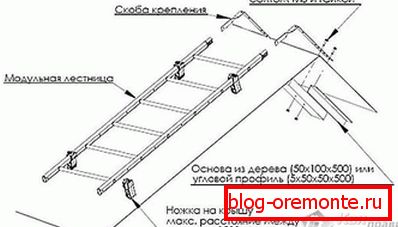
And only after that the docking of the wall span of the ladder with the main part already placed on the roof is made (with the help of two connecting brackets). During installation, it is necessary to ensure that its lower step-crossbar is at a height of the order of one meter above the ground, and the upper one is about 10 cm above the level of the cornice.
At the final stage of the assembly, the brackets pre-installed on the roofing section of the ladder are mounted at pre-designated points of the slope with the obligatory use of special sealing gaskets.
Video
The option of making a wooden ladder in the following video: